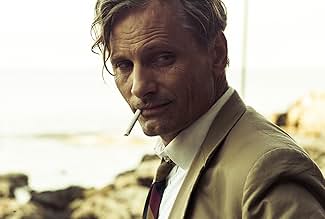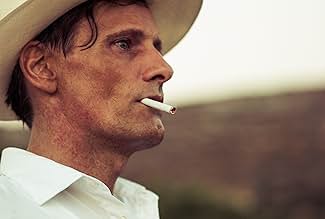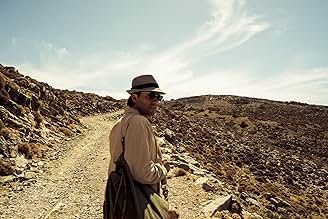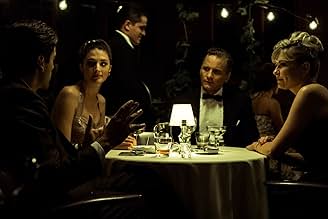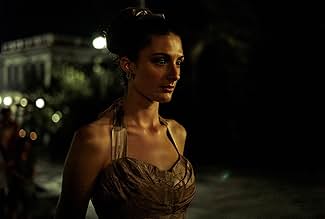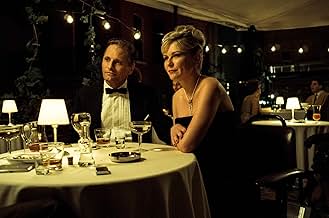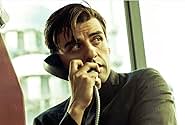VALUTAZIONE IMDb
6,2/10
34.685
LA TUA VALUTAZIONE
La storia di un truffatore, sua moglie e uno sconosciuto che fuggono da Atene dopo che uno di loro è stato coinvolto nella morte di un detective privato.La storia di un truffatore, sua moglie e uno sconosciuto che fuggono da Atene dopo che uno di loro è stato coinvolto nella morte di un detective privato.La storia di un truffatore, sua moglie e uno sconosciuto che fuggono da Atene dopo che uno di loro è stato coinvolto nella morte di un detective privato.
- Regia
- Sceneggiatura
- Star
- Premi
- 3 candidature totali
Babis Hatzidakis
- Stall Keeper
- (as Babis Chatzidakis)
Stella Fyrogeni
- Barmaid
- (as Stela Fyrogeni)
Recensioni in evidenza
'The to faces of January' is an old-fashioned, decent thriller with a nice sixties setting and solid acting. Everything about it is immaculate. The plot is intelligent enough: a couple of rich tourists meet a young American tour guide, who accidentally witnesses the husband committing a crime. One thing leads to another, and soon enough the guide is caught in a web of lies and deceit, and it becomes impossible to escape without incriminating himself. The crime story is spiced up by the mutual romantic attraction between the guide and the young wife. There is even a sort of life lesson included: money is the root of all evil.
The movie is well worth seeing, if only because it is nice to see a film that's not experimental, violent, provocative, filled with special effects or in one way or another trying to be hip or trendy.
I can see why so many reviewers make references to Hitchcock. The film is set in the early sixties, the era in which Hitch made some of his best films like 'The Birds' or 'Marnie'. Still, this film lacks the touch of a genius like Hitchcock. The characters have no extra psychological layers, and the unconventional scenes and themes that make the Hitchcock-movies so special, are absent in this film.
The movie is well worth seeing, if only because it is nice to see a film that's not experimental, violent, provocative, filled with special effects or in one way or another trying to be hip or trendy.
I can see why so many reviewers make references to Hitchcock. The film is set in the early sixties, the era in which Hitch made some of his best films like 'The Birds' or 'Marnie'. Still, this film lacks the touch of a genius like Hitchcock. The characters have no extra psychological layers, and the unconventional scenes and themes that make the Hitchcock-movies so special, are absent in this film.
Film opens at the Parthenon in Athens. A young male guide, played by Oscar Isaac, is guiding some impressionable girls. An older couple enter the scene. The male, played by Viggo Mortensen, is mature. His younger wife, played by Kirsten Dunst, looks like Doris Day. Thus we seem catapulted into the Hitchcock era. Film is in fact set in 1962, and all scenes seem authentic.
A central theme of far too many Hitchcock films to list, is that of an innocent man caught up in events over which he has no control. In this film, however, we quickly find that Mr Mortensen's character is no innocent. He is, however, quickly thrust into events that are out of his control.
Within the central trio of characters, it is unclear what are their individual motives, or, who is trying to con who. The sexual chemistry and tensions remind of 'Knife in the Water' (1962).
Film is a true Hitchcockian-style suspense movie rather than a thriller. As the tension rises so does the music, which also is pure Hitchcockian, and could easily have been lifted in great chunks from one or more of his movies.
As the tension rises, so too does the pace. From the start, the film moves at a decent pace, but this builds as the film progresses, and the pace gets faster and faster. Great camera shots, great chases, and iconic scenes, also suggest homage to 'The Third Man (1949).
All location shooting was superb. This reviewer, once attempting to follow in the footsteps of Plato, got lost in the mountains, and had to be rescued by shepherds. So it was with a fond familiarity that I saw those same mountains.
One explanation for the Hitchcockian-feel to the movie can be explained by the fact that the film is based on a novel by Patricia Highsmith. Alfred Hitchcock's classic 1951 film 'Strangers on a Train' was also based on a novel by Miss Highsmith. Thus perhaps it may be more accurate to describe the feel and touch of the movie as Highsmithian rather than Hitchcockian. Miss Highsmith is also the origin of the 'Ripley' stories.
This flawless and faultless masterpiece of a film, is the first full-length film directed by Hossein Amini. He also wrote the screenplay.
This film will appeal to all, though the 12A certificate means that it is unsuitable for young children. Suitable for all others, it is very suitable, and it will be very much appreciated, by classicists and Hitchcock fans.
A masterpiece! 10/10!
A central theme of far too many Hitchcock films to list, is that of an innocent man caught up in events over which he has no control. In this film, however, we quickly find that Mr Mortensen's character is no innocent. He is, however, quickly thrust into events that are out of his control.
Within the central trio of characters, it is unclear what are their individual motives, or, who is trying to con who. The sexual chemistry and tensions remind of 'Knife in the Water' (1962).
Film is a true Hitchcockian-style suspense movie rather than a thriller. As the tension rises so does the music, which also is pure Hitchcockian, and could easily have been lifted in great chunks from one or more of his movies.
As the tension rises, so too does the pace. From the start, the film moves at a decent pace, but this builds as the film progresses, and the pace gets faster and faster. Great camera shots, great chases, and iconic scenes, also suggest homage to 'The Third Man (1949).
All location shooting was superb. This reviewer, once attempting to follow in the footsteps of Plato, got lost in the mountains, and had to be rescued by shepherds. So it was with a fond familiarity that I saw those same mountains.
One explanation for the Hitchcockian-feel to the movie can be explained by the fact that the film is based on a novel by Patricia Highsmith. Alfred Hitchcock's classic 1951 film 'Strangers on a Train' was also based on a novel by Miss Highsmith. Thus perhaps it may be more accurate to describe the feel and touch of the movie as Highsmithian rather than Hitchcockian. Miss Highsmith is also the origin of the 'Ripley' stories.
This flawless and faultless masterpiece of a film, is the first full-length film directed by Hossein Amini. He also wrote the screenplay.
This film will appeal to all, though the 12A certificate means that it is unsuitable for young children. Suitable for all others, it is very suitable, and it will be very much appreciated, by classicists and Hitchcock fans.
A masterpiece! 10/10!
A thriller centered on a con artist (Viggo Mortensen), his wife (Kirsten Dunst), and a stranger (Oscar Isaac) who flee Athens after one of them is caught up in the death of a private detective.
Not being familiar with the novel, I cannot really comment on if this is a good adaptation or not. But it definitely is not as good a film as it could be. Mostly because it starts out strong and remains strong for the first half hour before suddenly going flat and staying flat. If the film could have kept its earlier pace and tone, it would be an incredibly gripping thriller.
Kirsten Dunst is excellent and understated. Mortensen is not half bad as the con artist. But they seem trapped in this script that never fully allows them to show their potential.
Not being familiar with the novel, I cannot really comment on if this is a good adaptation or not. But it definitely is not as good a film as it could be. Mostly because it starts out strong and remains strong for the first half hour before suddenly going flat and staying flat. If the film could have kept its earlier pace and tone, it would be an incredibly gripping thriller.
Kirsten Dunst is excellent and understated. Mortensen is not half bad as the con artist. But they seem trapped in this script that never fully allows them to show their potential.
The Two Faces of January is a gripping and highly watchable film which I would highly recommend. Set in the sixties, it is undeniably "old school" – a twisted tale of murder, treachery and double-dealing, based on the novel by Patricia Highsmith, where you half expect Alfred Hitchcock to appear in cameo at some point.
Viggo Mortensen (Lord of the Rings) and Kirsten Dunst (Spiderman) play Chester and Colette Macfarland a rich and affluent couple touring the sites and sounds of Europe, with us first catching up with them in a glorious looking Athens.
Appearing to be relaxed and happy together, they hide a dark secret that is about to catch up with them. Oscar Isaac – so fabulous in Finding Llewyn Davis earlier this year, and about to hit mega-stardom in the Star Wars reboot – plays American rogue Rydal, who seems to stare intently at Chester. Is he part of the impending storm, or just an innocent caught up in events he can't control? Tensions rise, not just because of the plot pressures but also because of the obvious sexual tension growing between the charismatic Rydal and Chester's lovely and much younger wife.
The compelling story – albeit somewhat predictable in places – takes in some fabulously atmospheric locations in Athens, Crete and Istanbul.
This is the feature directorial debut of Iranian-born Hossein Amini, who also wrote the screenplay – this being his forte have written a range of films including Drive and Snow White and the Huntsman. And what a good job he does, orchestrating location, lighting and music to great effect. Some of the editing is also very tight, cutting away from scenes at crucial points to maintain the story's mystery.
The trio of actors also bring great star power to their roles. Mortensen and Dunst are very watchable, but it is Isaac that again really shines in his role. In turns enchanting, brooding and cowed like a cornered animal, he plays the perfect James Stewart character in this Hitchcockian homage.
In the coming blitzkrieg of summer blockbusters, here is a jewel of a film that will be particularly enjoyed by older viewers who remember when story and location were put far ahead of CGI-based special effects.
(If you found this review helpful, please see my other reviews and 'Follow the Fad' at bobmann447.wordpress.com. Thanks.).
Viggo Mortensen (Lord of the Rings) and Kirsten Dunst (Spiderman) play Chester and Colette Macfarland a rich and affluent couple touring the sites and sounds of Europe, with us first catching up with them in a glorious looking Athens.
Appearing to be relaxed and happy together, they hide a dark secret that is about to catch up with them. Oscar Isaac – so fabulous in Finding Llewyn Davis earlier this year, and about to hit mega-stardom in the Star Wars reboot – plays American rogue Rydal, who seems to stare intently at Chester. Is he part of the impending storm, or just an innocent caught up in events he can't control? Tensions rise, not just because of the plot pressures but also because of the obvious sexual tension growing between the charismatic Rydal and Chester's lovely and much younger wife.
The compelling story – albeit somewhat predictable in places – takes in some fabulously atmospheric locations in Athens, Crete and Istanbul.
This is the feature directorial debut of Iranian-born Hossein Amini, who also wrote the screenplay – this being his forte have written a range of films including Drive and Snow White and the Huntsman. And what a good job he does, orchestrating location, lighting and music to great effect. Some of the editing is also very tight, cutting away from scenes at crucial points to maintain the story's mystery.
The trio of actors also bring great star power to their roles. Mortensen and Dunst are very watchable, but it is Isaac that again really shines in his role. In turns enchanting, brooding and cowed like a cornered animal, he plays the perfect James Stewart character in this Hitchcockian homage.
In the coming blitzkrieg of summer blockbusters, here is a jewel of a film that will be particularly enjoyed by older viewers who remember when story and location were put far ahead of CGI-based special effects.
(If you found this review helpful, please see my other reviews and 'Follow the Fad' at bobmann447.wordpress.com. Thanks.).
I agree with an earlier reviewer that this film derives much of its effect from being set in 1962. The period feel is beautifully communicated and the plot needs to work itself out in a world where places like Athens, Crete and Istanbul were not just exotic but isolated, where holidaying Americans would still be surprised and interested to meet other Americans, and people on the run could hope to hide away. The chemistry between the three leads, who are all well played, does lack fizz and there is a clumsy and rather hackneyed third act. But the film is never less than engaging and all the better for not resorting to surprise twists. The music tries too hard to be exciting, almost as if the director thinks the visuals need some extraneous help to keep the audience interested. I think he is wrong - there is enough going on here, including some fine acting and cinematography, to appeal to audiences who like films with substance, a trajectory, and a sound sense of place and time.
Lo sapevi?
- QuizViggo Mortensen on his character's wardrobe: "I particularly liked the white linen suit that you see in the poster that Chester wears, and in a way that's another character in the movie because the journey of that beautiful cream-colored linen suit, on the Acropolis in the sunshine in the beginning, this immaculate, perfect, fits perfectly, looks great. You see that suit at the very end of the story, and that suit's been through it, it's a bit torn, it's frayed, it's not as clean as it was, it's suffered almost as much as the man wearing the suit."
- BlooperIn the beginning Rydal recounts the legend of Aegeus on the steps of the Acropolis and says that it was there that Aegeus jumped to his death after his son, Theseus returned from Crete and forgot to change the black sails to white to denote his success. This is untrue; you would not be able to see the Aegean from the Acropolis, anyway. According to the legend Aegeus was waiting for the ships to arrive at Cape Sounion and when he saw the black sails he plunged into the sea (which is called the Aegean Sea after him). It is unlikely that a tour guide would not know how to recount the legend properly.
- Citazioni
Chester MacFarland: I'm sorry I disappointed you.
- Curiosità sui creditiAfter the production company logos, there are no opening credits.
- ConnessioniFeatured in Film '72: Episodio datato 5 marzo 2014 (2014)
I più visti
Accedi per valutare e creare un elenco di titoli salvati per ottenere consigli personalizzati
- How long is The Two Faces of January?Powered by Alexa
Dettagli
- Data di uscita
- Paesi di origine
- Siti ufficiali
- Lingue
- Celebre anche come
- The Two Faces of January
- Luoghi delle riprese
- Aziende produttrici
- Vedi altri crediti dell’azienda su IMDbPro
Botteghino
- Budget
- 31.000.000 USD (previsto)
- Lordo Stati Uniti e Canada
- 507.463 USD
- Fine settimana di apertura Stati Uniti e Canada
- 43.116 USD
- 28 set 2014
- Lordo in tutto il mondo
- 13.551.951 USD
- Tempo di esecuzione1 ora 36 minuti
- Colore
- Mix di suoni
- Proporzioni
- 2.35 : 1
Contribuisci a questa pagina
Suggerisci una modifica o aggiungi i contenuti mancanti

Divario superiore
By what name was I due volti di gennaio (2014) officially released in India in English?
Rispondi






